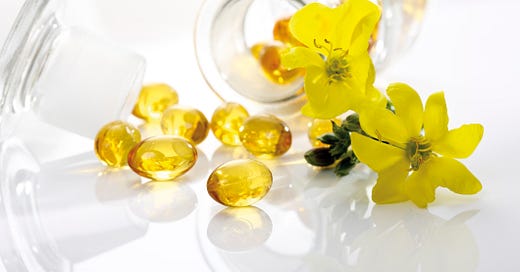My doctor recommended Evening Primrose Oil for Symptoms of Menopause. Does It Work?
-The Dodge
Short Take…
While evening primrose oil is often recommended for hot flushes (or hot flashes) and/or night sweats due to menopause, it is considered ineffective. While it hasn’t been well tested, the limited quality data we do have shows it doesn’t work. Also, there is no mechanism of action that fits for hot flushes/night sweats, meaning there is no biological reason to even support a hypothesize that evening primrose oil could help hot flushes.
Go On…
Evening Primrose Oil or EPO has been recommended for a variety of gynecological issues over the years, most commonly premenstrual syndrome (PMS), breast pain, and menopausal hot flushes. It is also recommended for many other non gynecological medical conditions, such as eczema. This should be the first thing that raises suspicions as breast pain, PMS, hot flushes, and eczema are all very different conditions with different physiological causes. A treatment that is good for all of these things is similar to saying there is a product that can fix your washer, fridge, furnace, and roof (other than a truly amazing handyperson, but even they use different tools depending on what needs fixing). A common tactic with alternative therapies is to claim they can treat 5, 10, or even more medical conditions. One of my rules (Gunter’s 7th rule, in fact) is the likelihood any therapy is effective for anything is typically inversely proportional to the number of medical conditions it claims to treat.
Here's some more common sense to consider: Hot flushes, breast pain, eczema, and PMS are all common and challenging medical conditions to treat. If there really were one chemical that could rule them all, the pharmaceutical industry would be all over it.
The hypothesis behind EPO is that it is high in gamma linoleic acid, one of the omega-6 fatty acids that is believed to have a favorable effect on inflammation. There is one quality clinical trial looking at EPO for hot flushes due to menopause and it doesn’t show any benefit. Although it’s a small study that enrolled 56 women and only 35 completed the protocol. There are a few other studies, but the quality is so low they don’t merit consideration. For example, one of the studies claimed that EPO could work for hot flushes because it has phytoestrogens, but it doesn’t contain phytoestrogens that we know of. So, you know, there’s that.
There is also no good data supporting its use for breast pain, PMS, or eczema. As this is medicine, if anyone can prove with quality studies that EPO is good for all of these conditions or even one of them, then of course we’ll use it because science changes with new information. But right now we have wild claims and no proof. That’s not science, that’s wishful thinking or a scam.
The National Center for Complementary and Integrative Health says the following, “There’s not enough evidence to support the use of evening primrose oil for any health condition.”
Bottom line, don’t waste your money.
Personal Note…
Why would a medical professional recommend EPO for menopause? Sometimes they just aren’t up to date, other times they have such a strong belief in complementary medicine that they ignore the data (so, bad training), but I also think it is a way to brush women off. After all, it’s easier to camouflage a platitude as “take some evening primrose oil” rather than devote the time it takes to explain the benefits and risks of the proven medical therapies for hot flushes, such as menopausal hormone therapy (MHT), cognitive behavioral therapy (MHT), gabapentin, and certain antidepressants.
In my opinion, give any medical professional recommending EPO for menopause a pass. If they are not up to date on this, what else are they wrong about?





Wow!
I have been taking these since I had a breast cancer scare and went to the specialist cancer diagnosis unit. They confirmed I had cysts and that EPO would help with the pain of them. This was a specialist breast consultant at the NHS.
So I have been using these for years and I'm only 42!!
But, my cysts have gone (so small I can't feel them) and therefore I dont have any pain. I guess coincidence!?